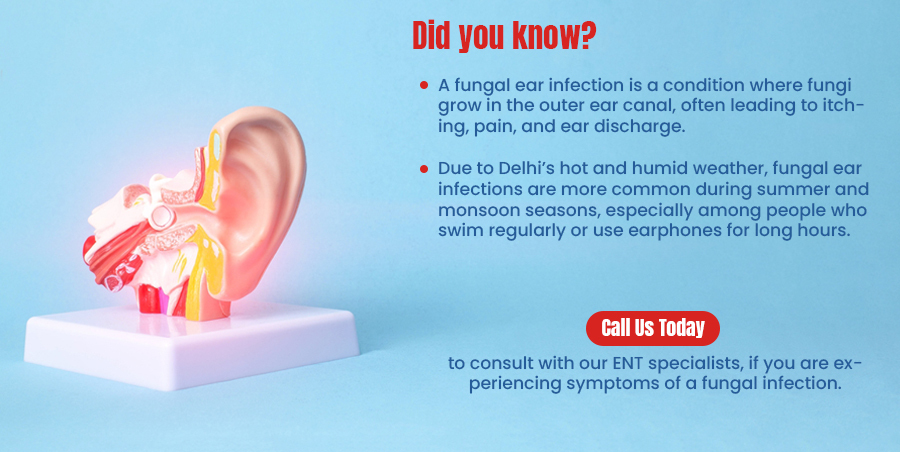Ear Fungal Infections: Types, Causes and Treatment Options
Fungal infections of the ear, also known as Otomycosis, are becoming increasingly common in warm and humid cities like Delhi and Mumbai. These infections affect the outer ear canal and are caused by the overgrowth of fungi, often leading to discomfort, itching, pain and even temporary hearing loss.
If left untreated, ear fungal infections can worsen and may lead to long term complications. Knowing the ear infections causes, symptoms, and treatment options can help you take timely action and avoid unnecessary discomfort.
At PSRI Hospital, our experienced ENT specialists diagnose and treat all types of fungal ear infections using safe, modern methods. In this blog, we explain how these infections develop, how to recognise them, and when to see the best ENT doctor in Delhi NCR for treatment.
What Causes Fungal Ear Infections and Who Is at Risk?
These infections often develop when certain conditions allow fungi to grow inside the ear. Below are the most common causes of fungal ear infections that you should be aware of.
- Excessive moisture in the ear: Swimming, sweating, or frequent cleaning can leave the ear canal damp
- Using cotton buds or sharp objects: This can damage the skin inside the ear and create space for fungi to grow
- Wearing earphones or hearing aids for long hours: This traps moisture and heat, ideal for fungal growth
- Weak immune system or diabetes: Common ear infection causes, especially in adults with underlying health issues
- Prolonged antibiotic or steroid use: These can upset the natural balance of organisms in the ear canal

Fungi like Aspergillus and Candida are often responsible for ear infection. While not always serious, fungal infections can be persistent and uncomfortable if not treated by a specialist.
Symptoms of Fungal Ear Infections
Fungal ear infection often starts with mild symptoms but can become uncomfortable if not treated early. Recognising the signs can help you seek timely treatment and avoid complications.
Common Ear Infections Symptoms are:
- Itching inside the ear canal: Often one of the first and most common symptoms
- Ear pain or discomfort: Can range from a dull ache to a sharper pain if the infection worsens
- Thick or coloured ear discharge: White, yellow, green, or black discharge may appear
- Feeling of fullness in the ear: Many people feel like the ear is blocked or clogged
- Temporary hearing loss: Caused by swelling or blockage due to fungal build up
- Redness or flaking skin around the ear: In some cases, skin irritation may extend beyond the canal
If you’re experiencing any of these symptoms, especially during humid weather or after water exposure, it’s best to consult the best ENT doctor in Delhi NCR for proper diagnosis and care.
How to Prevent Fungal Ear Infections
Fungal ear infections are often preventable with the right hygiene practices and habits. Here are a few simple steps that can reduce your risk, especially in humid cities like Delhi:
- Keep your ears dry: Gently dry your ears using a clean towel after bathing or swimming. You can tilt your head to let any trapped water drain out.
- Avoid inserting objects into the ear: Cotton buds, hairpins, or fingers can damage the ear canal and increase infection risk
- Limit use of earphones and hearing aids in hot weather: Take breaks to let your ears breathe and reduce moisture build-up.
- Manage sweat and humidity: Stay cool and clean and avoid excessive sweating as it can make ear infections more possible.
- Do not self-treat with ear drops without guidance: Always consult a doctor before using any ear drops or medicines.
- Control underlying conditions like diabetes: High blood sugar levels can make you more prone to fungal infections.
Conclusion
Fungal ear infections may seem minor at first, but they can quickly become uncomfortable and persistent if left untreated. Recognising early symptoms and knowing when to seek help can prevent further complications and protect your hearing health.
At PSRI Hospital, our ENT specialists offer comprehensive Ear Infections Treatment with care, accuracy, and personal attention, using safe and effective methods to ensure lasting relief and recovery. Whether it’s cleaning the ear canal, prescribing antifungal drops, or providing follow-up care, we focus on long term relief and recovery.
Need relief from a Fungal Ear Infection?
Don’t ignore the signs, get expert care at PSRI Hospital, the best hospital in Delhi for ENT treatments. You can also visit www.psrihospital.com to book your appointment today.
FAQ’s
Q1. Can a fungal ear infection go away on its own?
Ans. Fungal ear infections usually require medical treatment. While mild cases may improve slightly, most need proper antifungal medication to fully heal.
Q2. How long does it take for a fungal ear infection to clear up?
Ans. With treatment, most fungal ear infections clear up within 7 to 10 days. Severe or recurring cases may take longer and require follow-up care.
Q3. Is a fungal ear infection contagious?
Ans. Fungal ear infections are not usually contagious, but sharing earphones, towels, or ear-cleaning tools can increase the risk of spread.
Q4. Can I use home remedies for fungal ear infections?
Ans. Home remedies are not recommended for ear infections. Incorrect treatment can make the condition worse. Always consult an ENT specialist.
Q5. What happens if a fungal ear infection is left untreated?
Ans. If ignored, the infection can worsen, cause hearing loss, damage the ear canal, or lead to repeated infections.

 Book An Appointment
Book An Appointment Virtual Consultation
Virtual Consultation





